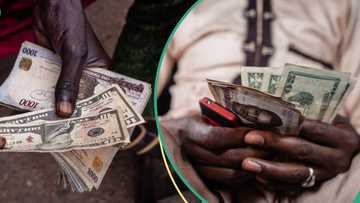Zenith, Access, FBN Holdings, Other Banks With Highest Amount of Money Kept With CBN
- The CBN has further tightened the monetary policy during its last monetary policy meeting
- In one year, the reserve kept in the CBN by commercial banks increased to N17.26 trillion from N10.13 trillion
- Zenith, Access, FBN Holdings and others top the list of banks that have the highest reserve with the CBN
Legit.ng journalist Zainab Iwayemi has over three years of experience covering the Economy, Technology, and Capital Market.
To combat persistent inflation, the Central Bank of Nigeria (CBN) has tightened monetary policy.
The initiative aims to restrict commercial banks from providing credit to lenders and ultimately arrest inflation spiralling out of control.

Source: UGC
According to a Daily Trust analysis, the required cash reserve deposits with the central bank increased from N10.13 trillion in December 2022 to N17.26 trillion as of December 2023, a 70.37% increase.

Read also
Access, UBA, GTB, other banks, traders sell dollar at new exchange rate as naira falls again
PAY ATTENTION: Share your outstanding story with our editors! Please reach us through info@corp.legit.ng!
Banks with the highest reserves
The Cash Reserve Ratio (CRR) limits banks' capacity to lend because it mandates that they keep a growing amount of local currency deposits with the central bank, where the reserves are only accessible for intervention.
- Zenith Bank - N3.90trn
- Access Bank - N3.10trn
- FBN Holdings - N2.08trn
- United Bank for Africa - N2.68trn
- Guaranty Trust Holdings - N1.64trn
- Fidelity Bank - N1.17trn
- First City Monument Bank - N776.54bn
- Stanbic IBTC Holdings - N927.58bn
- Sterling Bank - N450.29bn
- Wema Bank - N503.25bn
At 45%, the nation's CRR is among the highest globally.
Similarly, the CBN announced a review of the loan-to-deposit ratio (LDR) for banks, lowering it from 65% to 50% by the current monetary tightening.
LDR assesses a bank's liquidity by comparing the total amount of loans extended with the total amount of deposits received.
This was made public by CBN on Wednesday in a circular signed by Adetona Adedeji, acting head of the banking supervision department, and titled "Re: Regulatory Measures to Improve Lending to the Sector of the Nigerian Economy."
It stated:
“Accordingly, the CBN has decided to reduce the LDR by 15 percentage points to 50 per cent in a similar proportion to the increase in the CRR rate for banks.”
It mentioned that all DMBs must keep this standard up to date and that average daily data will still be used to gauge compliance.
Experts speak
Increased rates, according to analysts at professional services company KPMG, may make it more difficult for banks to channel lending to help the economy's aggressive growth strategy.
Thus, the attainability of the government's economic objective is further clouded by the restrictive monetary policy environment.
Speaking on the reduction of LDR, an analyst at Afrinvest said:
“In our view, this downward review of LDR allows banks to comply with the 45.0 per cent CRR directive and eases off pressure on the lenders considering the restrictive nature of other CBN directives, including the Net Open Position (NOP) ceiling of 20.0 per cent short and 0.0 per cent long. Thus, we believe this policy would enhance the ability of banks to sweat out assets without creating unnecessary risks.”
Operating profits of banks
Legit.ng also reported that the combined operational expenses of ten Nigerian banks increased from N2.26 trillion to N3.23 trillion in 2023, a 42.51% increase.
The annual reports that the financial institutions provided to the Nigerian Exchange Limited were the source of these numbers.
Access Holdings, FBN Holdings, Zenith Bank, United Bank for Africa, FCMB Group, Sterling Financial Holding, Fidelity Bank, Wema Bank, Stanbic IBTC, and Guaranty Trust Holding Company were among the financial firms that were subject to scrutiny.
PAY ATTENTION: Stay Informed and follow us on Google News!
Source: Legit.ng


